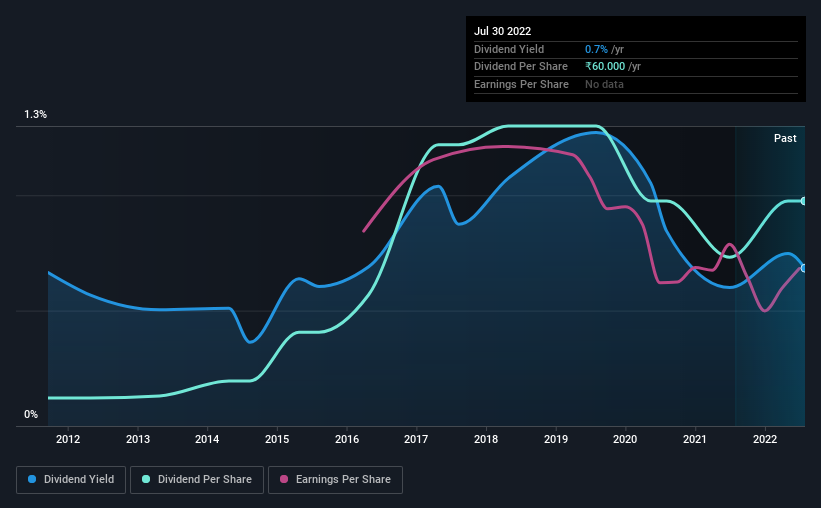Maruti Suzuki India (NSE:MARUTI) Has Announced That It Will Be Increasing Its Dividend To ₹60.00

Maruti Suzuki India Limited (NSE:MARUTI) has announced that it will be increasing its dividend from last year's comparable payment on the 30th of September to ₹60.00. Although the dividend is now higher, the yield is only 0.7%, which is below the industry average.
See our latest analysis for Maruti Suzuki India
Maruti Suzuki India's Earnings Easily Cover The Distributions
Even a low dividend yield can be attractive if it is sustained for years on end. Based on the last payment, Maruti Suzuki India's earnings were much higher than the dividend, but it wasn't converting those earnings into cash flow. In general, we consider cash flow to be more important than earnings, so we would be cautious about relying on the sustainability of this dividend.
The next year is set to see EPS grow by 39.2%. If the dividend continues along recent trends, we estimate the payout ratio will be 29%, which is in the range that makes us comfortable with the sustainability of the dividend.

Dividend Volatility
The company has a long dividend track record, but it doesn't look great with cuts in the past. Since 2012, the dividend has gone from ₹7.50 total annually to ₹60.00. This works out to be a compound annual growth rate (CAGR) of approximately 23% a year over that time. It is great to see strong growth in the dividend payments, but cuts are concerning as it may indicate the payout policy is too ambitious.
Dividend Growth May Be Hard To Come By
With a relatively unstable dividend, it's even more important to see if earnings per share is growing. Maruti Suzuki India has seen earnings per share falling at 10.0% per year over the last five years. If the company is making less over time, it naturally follows that it will also have to pay out less in dividends. However, the next year is actually looking up, with earnings set to rise. We would just wait until it becomes a pattern before getting too excited.
Maruti Suzuki India's Dividend Doesn't Look Sustainable
In summary, while it's always good to see the dividend being raised, we don't think Maruti Suzuki India's payments are rock solid. While the low payout ratio is redeeming feature, this is offset by the minimal cash to cover the payments. We would probably look elsewhere for an income investment.
Companies possessing a stable dividend policy will likely enjoy greater investor interest than those suffering from a more inconsistent approach. However, there are other things to consider for investors when analysing stock performance. For example, we've picked out 1 warning sign for Maruti Suzuki India that investors should know about before committing capital to this stock. If you are a dividend investor, you might also want to look at our curated list of high yield dividend stocks.
New: Manage All Your Stock Portfolios in One Place
We've created the ultimate portfolio companion for stock investors, and it's free.
• Connect an unlimited number of Portfolios and see your total in one currency
• Be alerted to new Warning Signs or Risks via email or mobile
• Track the Fair Value of your stocks
Have feedback on this article? Concerned about the content? Get in touch with us directly. Alternatively, email editorial-team (at) simplywallst.com.
This article by Simply Wall St is general in nature. We provide commentary based on historical data and analyst forecasts only using an unbiased methodology and our articles are not intended to be financial advice. It does not constitute a recommendation to buy or sell any stock, and does not take account of your objectives, or your financial situation. We aim to bring you long-term focused analysis driven by fundamental data. Note that our analysis may not factor in the latest price-sensitive company announcements or qualitative material. Simply Wall St has no position in any stocks mentioned.
About NSEI:MARUTI
Maruti Suzuki India
Engages in the manufacture, purchase, and sale of motor vehicles, components, and spare parts primarily in India.
Excellent balance sheet with acceptable track record.


